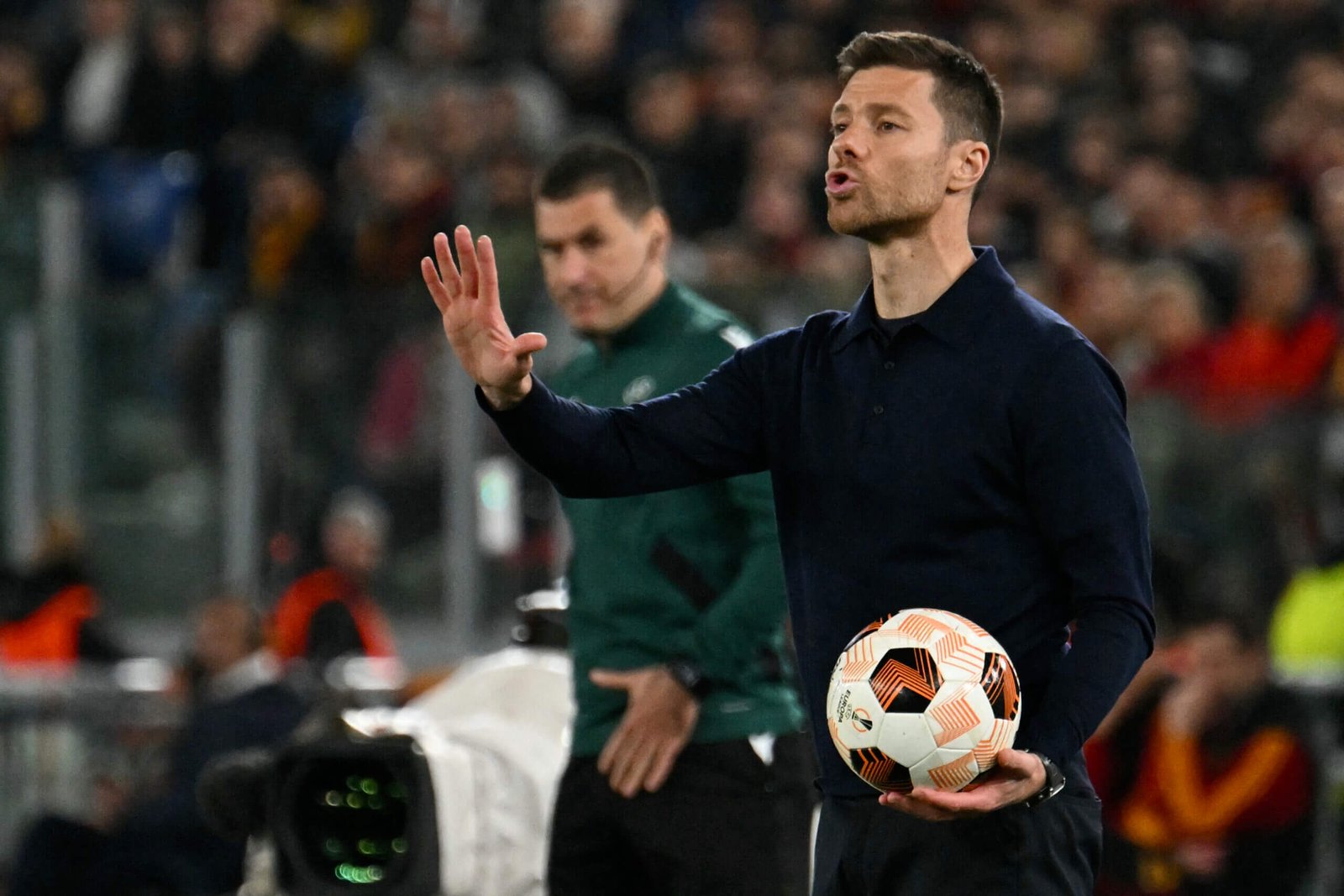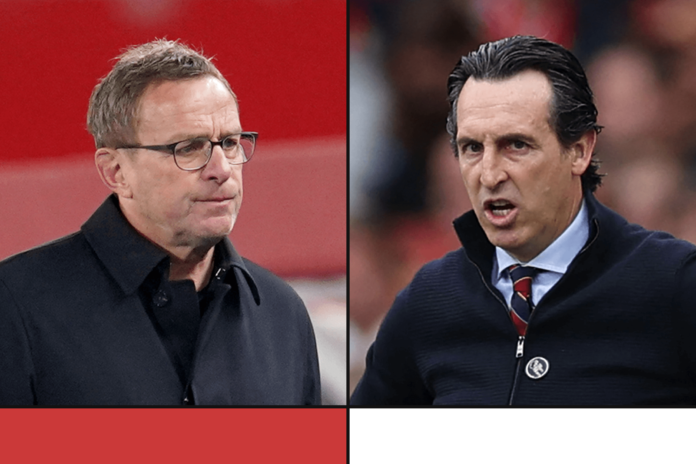Bayern Munich are still searching for a new head coach.
With Thomas Tuchel due to leave the club in the summer, Austria national team manager Ralf Rangnick had been expected to replace him.
But earlier this month, with a deal seeming likely, Rangnick shocked Bayern by declining that opportunity, becoming the fourth candidate to stay in their job.
Julian Nagelsmann opted to extend his contract and remain coach of the German national team. Xabi Alonso, who would have been of interest to Bayern, was unwilling to depart Bayer Leverkusen. He chose to stay and defend the Bundesliga title next season.
Aston Villa’s Unai Emery was of interest, too. Villa have constructed their football department around Emery. One of his closest friends, Damian Vidagany, has recently become the club’s director of football. Monchi, with whom Emery worked successfully at Sevilla, is the president of football operations. Unsurprisingly, surrounded by allies and a large, hand-selected, Spanish-speaking coaching staff, Emery was happy to remain in England — with Villa extending his contract.
Rangnick’s decision was the most unexpected, though. It seemed unlikely he would reject opportunity to take the highest-profile job of his career.
And over the last few days, yet another approach was turned down. This time, Bayern went for Crystal Palace’s Oliver Glasner, who has impressed since he joined the south London club. The German giants are still without a new head coach.
This is how Bayern’s frustrating search has unfolded.
Elsewhere on The Athletic…
Bayern thought it was likely that Rangnick would take the job. Despite some initial trepidation, the more conversations Rangnick had with club officials, the more convinced he had become that he was being presented with a rare opportunity and a mandate for change at one of the world’s biggest clubs.
Nagelsmann chose to stay with Germany (Stuart Franklin/Getty Images)
After an unprecedented period of success and a run of 11 straight Bundesliga titles, Bayern recognise that their team needs to be rejuvenated. Some players need to leave for political reasons. Others are placing too much strain on the wage bill and not offering enough on the pitch.
Rangnick would have received the full support of the board to lead that reconstruction over several years. In addition, he would have worked with Christoph Freund, the sporting director, who came to Bayern from the Rangnick-built Red Bull system, and Max Eberl, with whom he enjoys plenty of common ground ideologically. Jochen Sauer, Bayern’s head of youth development, was formerly managing director of Red Bull Salzburg. Like Freund, he was potentially another new colleague to have spent time within the Red Bull network. He and Rangnick get on well, too, and developing the pipeline between the first team and the club’s academy campus, built for €70million and opened in 2017, would have been another virtue.
Politically, those synergies and the level of support would have put Rangnick in an incredibly strong position, one perhaps unprecedented at Bayern in the modern era. He would also have earned almost 10 times his Austria salary.
And yet Rangnick said no. Why?
Fundamentally, as he expressed in a public statement, this was a decision for Austria rather than against Bayern — he did not want to leave his job. There are many reasons for that. One is that he enjoys the rhythm of international football. At 65, Rangnick no longer wants to be on the training pitch every day.
In Austria, the atmosphere is much more in his favour.
From being half-empty, the stadiums are full for their games and the squad are closer and happier than they were before he arrived two years ago. There is optimism about the European Championships, which begin in June, created by the team’s performances and also their high-pressing and aggressive style, which contrasts with his predecessor Franco Foda’s more conservative approach.

Alonso has won the Bundesliga title with Bayer and will stay there (Alberto Pizzoli/AFP via Getty Images)
Rangnick is popular with the public and the players, who had urged him to stay when news emerged of his talks with Bayern. Whether he accepted Bayern’s offer or not, Rangnick was always due to lead Austria to the European Championship, but there were fears that his accepting another position would disrupt the preparations for that tournament. His leaving would also have jeopardised Austrian plans before World Cup 2026, a tournament he is planning for.
The backbone of Austria’s resurgence has been a strong and close dressing room — it was part of Rangnick’s Bayern candidacy. Except for the period under Hansi Flick, every recent managerial reign at Bayern has been disrupted by issues between the coach and the players, with disagreements and disgruntlement leaking into the media.
Bayern want that to stop and Rangnick was thought to be capable of developing a new culture and fostering a greater sense of closeness. Internally, he was seen as having a more benevolent approach to players, certainly compared with Tuchel. Rangnick, by contrast to the outgoing Bayern head coach, prefers to develop players and, historically, has tended to be more supportive during periods of poor form.
The anticipated cultural shift at Bayern extended beyond the dressing room. While the club’s ambition demands that they compete for elite players in the prime of their careers, there is a desire to emphasise identifying future talent and producing stars, be it from the club’s academy or the outside. Across his career, particularly during the construction of the Red Bull network and his similar work at Hoffenheim, Rangnick preferred younger players and depended on astute recruitment. He was seen as ideal to lead Bayern’s transition.
Until the final moment, Rangnick seemed to view this as a chance too good to pass up. He never agreed to take the job, but the feeling at Bayern before his rejection was that, with only a few minor issues left to resolve, including who his assistant coaches would be, an agreement was likely. It never arrived. Bayern could not tempt Rangnick away from unfinished business in Austria.
Emery, another Bayern target, also felt he had unfinished business in his role at Aston Villa, who are heading for the Champions League. Conversations with Emery were never as advanced as they became with Rangnick. Bayern say there were never any official negotiations. That interest was headed off when Villa triggered a 12-month contract extension, which ties Emery to the club until 2027.
Regardless, Emery had his reservations about Bayern. At Villa, he enjoys an excellent relationship with Wes Edens and Nassef Sawiris, the co-owners. Bayern do not tend to cede power to a manager, give them the type of authority Emery wants or permit the number of coaches and staff members the Spaniard likes. At Villa, he has full autonomy to shape the football department, has more than two dozen Spanish-speaking staff and there is an expectation he will add more in the summer.
He has his first-choice backroom team, including coaches, analysts and doctors. The job title of Vidagany, Emery’s closest friend, changed during the off-season last year from personal assistant to director of football.

Austria’s players asked Rangnick not to leave (Eva Manhart/APA/AFP via Getty Images)
Bayern are also more similar in nature to Arsenal, where Emery lasted just 18 months before being sacked. His reflection on that period concluded that he was less attentive to the political side of his job than he might have been and that, to an extent, he was a victim of the executive restructuring that occurred around him during that period.
Emery was also thought to be wary of the public nature of some of the Bayern executives and their willingness to air views and grievances in public; it was closer to Arsenal than he was comfortable with.
So, where next for Bayern?
They are now out of the Champions League and have suffered a succession of setbacks in their hunt for a head coach. They were unsuccessful in appointing their first, second, third and fourth choices to succeed Tuchel. This process has been difficult.
Over the weekend, this saw them turn to Glasner. Bayern proposed an €18million (£15.5m) compensation package for the 49-year-old but Palace have no interest in letting him leave, valuing him at closer to €100m (£86m). Palace denied any direct contact from Bayern.
Earlier this month, Bayern declined to comment when asked by The Athletic whether Manchester United’s Erik ten Hag is of interest. Speaking to The Athletic in March, Freund said that the decision to part ways with Tuchel at the season’s end is final. The club offered no comment on whether the events of the past few weeks and Rangnick’s decision to remain with Austria has changed that position, but a source close to Tuchel, who asked to remain anonymous to protect relationships, denied reports he may stay at the club.
For now, the hunt continues.
(Top photo: Getty Images)
Read the full article here


